|
|
|
PART
V.
COUNTRY CHILDREN IN GENERAL IN this final chapter I propose to gather up some of the loose threads of my narrative that for one reason or another missed attention in the earlier chapters, and to study the effect on his character of the life the farmer's boy leads. Besides, I wish to tell something of the farmer's girls. They are an important part of the family life which this book attempts to portray, and I have given them too scant attention. They are not so important as the boys, to be sure, if we accept the latter's opinion, though you might think, after he gets to be sixteen or seventeen, he thought them more so, from the amount of attention he gives them. The small girl's likes and dislikes, her enthusiasms and pleasures, are to a large degree identical with the boy's. She will beat him half the time in the races that they run. If she has rubber boots, she is just as good a wader. She can play ball, climb fences, slide down hill, skate — indeed, do almost anything the boy can, with just the same interest and enjoyment. The girl is often a leader in roaming and adventure, and some girls make excellent outdoor workers too. A lively and capable girl often wishes, I fancy, that she was a boy, and might have the boy's outdoor freedom; and sometimes, too, she envies his opportunity to cope with vigorous work and win a name and place in the world. At any rate, she wishes she could slip away from the confining housework and more sober demeanor which she is expected to have. On farms where boys are lacking, the girls sometimes, of necessity, do the boy's work. They drive the cows to pasture, help in hoeing and weeding, load the hay, and pick up potatoes. But usually they only hover around the edges of the outdoor work. They take care of a corner in the garden and a strip of flower-bed, feed the chickens, run on errands, and help pick apples. The smallest girls, unless their folks' are uncommonly particular, run around about as they please, and dip into as many different kinds of work as they choose, and they get just as smutty and dirty as any of the boys. When the girls get into long dresses they become more and more particular as to what they are seen doing about the fields, and they avoid anything but the lightest muscular exertion, and not all of them even dare to make a spectacle of themselves by riding around on the horse-rake and tedder. 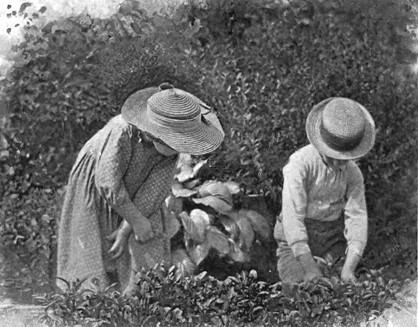 Weeding the posy bed The girl is early taught to wash and wipe the dishes, to sweep, to mend rents and sew on buttons. The boy has to acknowledge that in these things his sister beats him. She can do every one quicker and better than he can, though he claims that the buttons she sews on will come off, and that, give him time enough, he can sew a button on so that he can depend on that button's staying where it was put to his last days. It is certain, too, that the girl is apt to be quicker with her mind than the boy. She has her lessons better in school, and she is more docile in her behavior. Often she is the boy's helper and adviser in all sorts of difficulties and troubles, and is a companion who is safer and better for him in almost every way than any of his mates. We all crave a sympathetic understanding and interest in our doings. It is the mothers and sisters who are most apt to have these qualities, and it is to them that the boys go most freely with their woes and pleasures. They are far safer confidants than the rest of the world, and the boy is likely to have reason for sorrow in later life because he did not follow their wishes and advice more closely. All kinds of boys are to be found on our New England farms — good and bad, handsome and homely, bright and dull, strong and weak, courageous and timid, generous and mean. I think the better qualities predominate. The typical boy is a sturdy, wholesome-looking little fellow, with chubby cheeks that are well tanned and freckled in summer, and that in the winter take a rosy glow from the keenness of the air. The same is more mildly true of the appearance of the little girls, and with some advantages in their favor. You take a group of country girls some June morning, on their way to school, with their fresh faces and clean, starched aprons — they look, as Artemus Ward says, "nice enough to eat without sass or seasonin'." 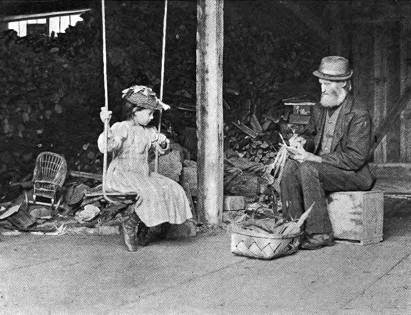 Grandpa husks sweet corn for dinner, and tells a story at the same time As the children grow up they are apt to lose much of their simplicity and attraction. They become self-conscious and in many ways artificial, particularly in their manner and in their pleasures. This is not especially apparent in their work, and there are those who continue to a large degree refreshingly earnest and natural in whatever they do; and country life all through, with its general habits of labor and economy and its comparative seclusion, is less artificial than that of the cities. Yet there are the same tendencies in both places. The girl becomes increasingly anxious about the mode of her dress — she wants to have all the latest puckers of the world of fashion. She twists and cuts off and curls and frizzes her hair, and she braids it and rolls it and makes it stand on end in her effort to find the adjustment most becoming to her style of beauty. The result sometimes is that she has the appearance of having gone crazy. She wears toothpick-toed, high-heeled shoes, and declares publicly that they couldn't be more comfortable, while privately she complains of corns. For society use she cultivates a cultured tone of voice and some tosses of the head, rolling up of the eyeballs, shrugging of the shoulders, etc., calculated to be "killing." She has an idea that it is becoming in her to appear to take fright easily, and she screeches at sudden noises, and is in a panic at the appearance of the most scared and tiny of mice. A good deal of this is done for its effect on the boys. It seems to interest and entertain them, and keep them hanging around. The girls sentimentalize a good deal about the boys when they get into their teens. They keep track of who is going with who, and pick his looks and characteristics, in their shallow way, all to ravelings. What a fellow says, how he curls his mustache, how he parts his hair, how horridly or how well he dances, how late it was when he got home from the last party, etc., are discussed at all kinds of times and places. Two girls who have come home from meeting together some cold autumn night will loiter and freeze to death at the gate where they are to part, talking for an hour or more over the "fellows" after this manner. The result is that their minds come into a state where subjects without a gossipy or sentimental turn have no interest. As a rule, the boys fall into the girls' ways, and, noting how the current runs, encourage them. There is among the young people a good deal of flirtation, which I take to be a kind of aimless play both of talk and manner that hangs around the borders of the sentimental, and often gets a good way beyond it. The boy who avoids this sort of thing is said to be bashful; he is afraid of the girls, has no sentiment, and all that. This may be a sufficient explanation in some cases, but in others the trouble is not in the girls, but in this kind of girls. It may be because the boy has more sentiment than the average that this sort of society is distasteful to him. 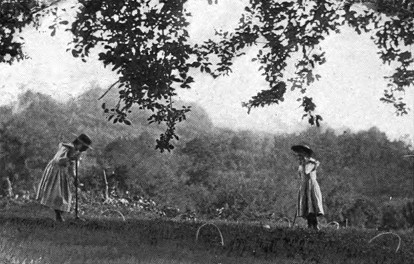 A game of croquet Most boys are not as sentimental as are most girls. They are more workaday and practical. Their life, in the matter of getting a living, has more responsibility than the girls'. At the same time, the boy gains a coarseness of thought and feeling often in his companionship with the men and boys he is thrown in with that the girl is almost altogether free from. It is a curious idea of manliness a boy sometimes has. He tries to express a grown-up competence to take care of himself by a rough manner and rude speech, and ability to enter into the spirit of the worst kind of conversation and stories not only without a blush but with sympathetic guffaws of laughter. He resents his parents' authority; he likes to resort to the loafing places when he has leisure. He aspires to smoke and chew and spit, like the rest of the loafers there. This may be an extreme picture, but there are a vast number of boys it will fit to a degree. Most country boys admire the gentility of smoking, and will be at great pains to acquire the habit after they get to be fifteen or sixteen years old. Perhaps the average boy never becomes a frequent smoker, but he likes the pleasurable feeling of independence it gives him, when he starts off for a ride, to have a cigar tilted neatly upward from the corner of his mouth. It stamps him a gentleman to all beholders, and the lookers-on know from his manner and cigar that he is a person of vigorous and stoutly held opinions that it would be best not to attempt any fooling with. 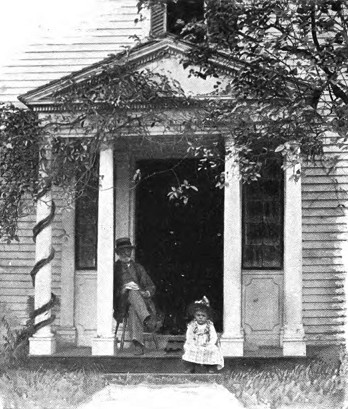 Afternoon on the front porch When you see a young man gayly riding by, sitting up very straight, with his best clothes on and his five-cent cigar scenting the air with its gentle aroma, you may know he is going to take his girl to ride. If he can by any manner of means find the money at this time of his career, the young man buys a fast horse and a shiny buggy carriage. He fairly dazzles your eyes as he flits swiftly past. Sometimes it takes more than one horse to finish his courting, for the first one may die of old age before he gets through. But whatever disappointment the young man suffers in his love affairs, and however his fancy or what not makes him change one girl for another, you can not see, when he starts on his journeys, that he has ever lost aught of that first freshness of demeanor that characterized him, and the perfume of his cigar has the same old five-cent fragrance. After all, these young fellows who go skirmishing around in this fashion are mostly hearty and good-natured. When such a one marries, his horse goes slower, the polish wears off from his carriage, he neglects his cigar, and the two settle down, as a rule, into a very staid and comfortable sort of folks. They might have been wiser, they might have got more from life; so could we all of us. Shakespere said that "all the world loves a lover," and people are fond of repeating this saying; but that was three hundred years ago. I don't know how it was then, nor how it is in other parts of the world now. I am very sure, however, that New England people do not love a lover. He is a butt for more poor jokes than any other character. We think he is ridiculous. We call him off and set him on, and scare him and encourage him. We at least make that other saying come true, that "faint heart ne'er won fair lady." As for the girl, I imagine that among her friends she gets a gentler and more coddling treatment. Even the smallest children in some families have to endure a lot of talk from their elders about their "girls" and "fellows" that is the most sickly sort of sentimentality. If let alone, the children's minds do not run much on these lines, though they occasionally, in their innocent way, build some very pretty castles in the air, that soon melt away harmlessly into nothing in the warmth of their other interests. Boys, when they begin to go to the larger schools of a town, are apt to learn a variety of rough tricks, exclamations, and slang that shock the folks at home when the boys get to showing off within their sight and hearing. With the best of them the largest part of this presently wears off Others cultivate their accomplishments, and even make their conversation emphatic with certain of the swear words. Such boys the righteous of the community condemn as altogether bad, though it sometimes happens that even they have redeeming traits. I do not think that lying is a common fault of country boys, though most of them find themselves at times in circumstances that make it difficult to abstain from giving the truth a pretty severe straining; and perhaps most have two or three lies on their consciences that are undoubtedly black. But the boy has probably repented these in shame and sorrow, and hopes he never will be tempted again to tell one of the untruths he so despises. Really bad and unblushing lying a boy is apt to learn, if ever, after he gets among the older and rougher boys who hang around the post offices every evening at mail-time, or who attend the center schools of the town. The farm, more than most places, tends to give children habits of thrift and singleness of purpose in the pursuit of education. There is seclusion enough on the majority of farms, so that the children are not confused by a multiplicity of amusements and too much going on. This seclusion may make some dull, but to others it gives a concentrated energy that makes them all through life untiring workers and stout thinkers. Often from such a start they become the world's leaders in many widely scattered fields of usefulness. Because you are a farm-boy, it is not, however, certain that you have only to seek the city to win fame and fortune. The city is already crowded with workers and with ability. It is a lonely, homesick place, and many years must pass before a person can win even a position of safety and comfort. The boys with good habits and health and a strong will have the best chance. The boy with loose habits and lack of energy will find more temptations to a weak and purposeless career than in the country. Some boys and girls can live lives of wider usefulness in the large towns than in the country, and it is best for them to go there; but it is a serious question for most whether they will gain anything by the change. 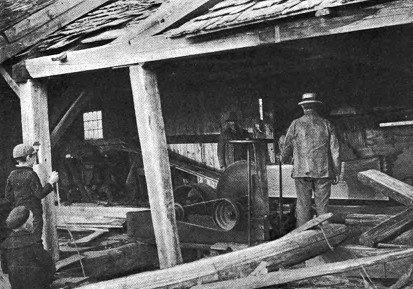 A sawmill It was my plan, in this book, to take the farmer's boy straight through the year. There still remains a final month that has not been treated. With Thanksgiving, autumn ends and winter begins. The trees have been bare for some time, the grasses withered brown, and the landscape white with frost every morning. There have been high winds whistling about the farm buildings and scurrying through the leaf litter of the fields. Snow squalls have whitened the air, and the roadway pools have frequently been glazed with ice. But the solid freezing and snows of winter are not looked for until after Thanksgiving. The boy gets out his old mittens, and his cloth cap that he can pull down over his ears, and he keeps his coat collar turned up, and hugs himself and draws himself into a narrower compass as he does his outdoor work. On some cold morning he gets out his sled, and if he finds a bank steep enough he slides down on the frost very well. He tries such ice as comes in his way, and of course breaks through and gets his feet muddy. 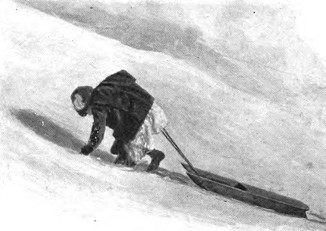 Going up for a slide Then real winter comes, the world is all white, and sleighbells jingle along the road, and the ponds and rivers are bridged with solid ice. The boy, with some other boys, and perhaps some of the girls, too, is often out with his sled. They do a good deal of sliding down the steepest kind of hills — indeed, that is the sort they search out; and if it has a few lively humps in it, so much the better. They dash down the decline in the most reckless fashion, and then keep going up a little higher to make the descent still faster and more exciting. One little fellow, who lies flat on his sled and steers with his toes, gets slewed out of the track and goes rolling over and over with his sled in a cloud of flying snow. You would think it would be the end of him; but he gets tip dazed, and powdered white from head to foot, and his lip quivers, and some tears trickle from his eyes. He says in his shaky voice that he is going home. The other boys gather round and brush him off, and Willie Hooper lends him his handkerchief, when the boy can't find his own; and they tell him how he looked going over and over, and what he ought to have done; and that he is all right, and to "come on, now; there ain't no use of goin' in just for that; we'll have a lot of fun yet" The boy finds himself comforted, and in a few minutes he is as lively, careering down the hill with the others, as ever. By the time a boy gets to be six or seven years old he expects to find a pair of skates in his Christmas stocking. For some time after that his head accumulates bumps of a kind that would be apt to puzzle a phrenologist. It is astonishing in what a sudden and unexpected manner the skates will slip from under you! There's not even a chance to throw out your hands to save yourself. You are in luck if you can manage to sit down instead of going full-length. Your ankles wobble unaccountably, and the moment you leave off mincing along in a sort of awkward, short-stepped walk and try to strike out, down you go on your head. Then your skate-straps are always loosening, or getting under your skates and tripping you up, and your feet become cold and your mittens get wet. But the boy keeps at it with a perseverance under difficulty and disaster that would accomplish wonders if applied to work. In time he can skim around with any of them, and play shinny and skate backward and in a circle, and cut a figure 8 in the ice, and almost do a number of other remarkable things. The boy who skates much has to experience a few breakings through the ice. On the little ponds and near the shore this is often fun, and the boy who dares go nearest to the weak places and slides longest on a bender is a hero in his mates' estimation, and, I might add, in his own. When he does break in he very likely only gets his feet wet, and he does not mind that very much; but when he breaks through in some deep place, and does not grip the ice until he is in up to his arms, it is no smiling matter. He usually scambles out quickly enough, but the worst of it comes in getting home in his freezing clothing, that conducts the chill of the frosty air clear to his bones. Yet it rarely happens that anything serious comes of these accidents. The
year goes out with Christmas, the holiday that perhaps shines
brightest of all the list in the boy's mind. A few days before
its advent he and his folks visit the town, where all the stores are,
to make the necessary purchases. They do much mysterious advising
together, but never as a family group; there always is at least one
shut out. It takes a great deal of consideration and calculation to
make forty-nine cents go around among all your friends. But the
members of the family are usually considerate, and when the boy
fishes for hints of their likes, they make it clear, in suggesting
the thing they most want, that he will not have to spend such a great
deal. Then, while he is buying in the store, the others that happen
to be with him are always good enough to stand by the door and look
the other way, so that, of course, when they get their presents they
are a great surprise to them. 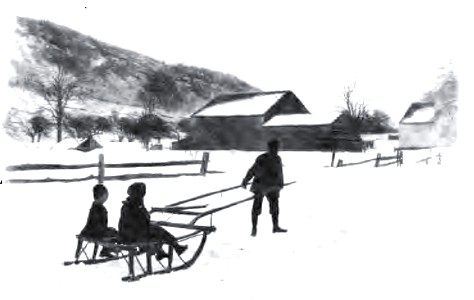 A winter ride Each of the children brings home various little packages, which they are at great pains to hide away from the others, though they can not forbear to talk about them darkly, and make the others guess, until they are almost telling themselves. Some of them, particularly the girls, are apt to be "making things" about this time, and you have to be careful how you notice what is left lying around, or you discover secrets, and there is likely to be a sudden hustling of things out of sight when you come into the room, and looks of such exaggerated innocence that you know something is going on. If you show an inclination to stop, your sister says, "Come, now, Tommy, do go along!" "What for?" says Tommy. "Oh, you've been in the house long enough!" is the reply. "Well, I guess I want to get warm," Tommy continues. "It's pretty cold outdoors. Say, what is it you're sitting on, Nell, anyway?" "I didn't say I was sitting on anything," says Nellie. "You just go along out, or you sha'n't have it!" Tommy blows his nose and laughs, and pulls on his mittens and shuffles off. On Christmas eve the children hang up their stockings back of the stove, and are hopeful of presents, in spite of the disbelief they express in the possibility of Santa Claus coming down the stovepipe. Sure enough, in the morning the stockings are all bunchy with the things in them, and the children have a great celebration pulling them out and getting the wraps off the packages. They do all this without stopping to get more than half dressed, and breakfast has to wait for them. They are in no haste, for they have popcorn and candy to munch on that they found in their stockings, and every one has to show all his things to each of the rest, and see all the others have, and spring the baby's jack-in-the-box about half a dozen times till they get used to the fright of it. They have better things to eat that day than usual, and more of them, and with that and the sweetmeats and extras some of the children are likely to get sick and quarrelsome before the day is out. 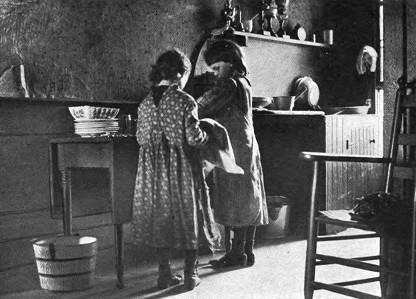 Washing the supper dishes In the evening there is, perhaps, a Christmas tree at the schoolhouse. There has been a turmoil of preparation in the neighborhood for several days previous; for the children have to be set learning pieces, and practising, and fixing up costumes, and cake and cookies and all the good things to eat have to be made ready, and some one has to collect the dimes and nickels and quarters to get candy and oranges and Christmas-tree trimmings with. Then some two or three have to make a journey to the woods and chop a good branchy hemlock or spruce of the right size and get it set up in the corner of the schoolhouse. Finally, the green curtains have to be hung that will separate the audience from the stage, where the small people do their acting and speak their pieces. The whole village turned out in the evening. They came on foot and they came in teams. Usually each group carried a lantern to light its way, and these were set in the entry when their bearers went in. The schoolhouse windows were aglow with light, and within things fairly glittered to the children's eyes. There were six lamps along the walls, besides those back of the curtains, and every one was lighted and turned up almost to the smoking point. Everybody was there, besides four boys from the next village, who sat on a front seat, and James Peterson's dog. Some of the big people got into some of the small seats, and certain of the neighbors who didn't get along very well with certain others had to manage carefully not to run across each other's courses. The air was full of the hum of talk, and the young people were running all about the open space and in and out the door, and there were consultations and gigglings and flurries over things forgotten or lost or something else, without number. The curtain was drawn, but you could see the top of the gayly loaded tree over it, and the movement of feet under it, and you could see queer shadows of figures within, doing mysterious things on it. Sometimes a figure brushed against the curtain, and it came bulging way out into the room, and the four boys from the next town had the greatest work to keep from exploding over the funniness of this; and, as it was, one of them tumbled off from the narrow seat he occupied. 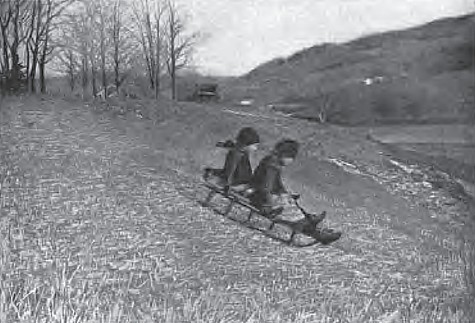 Sliding on the frost By-and-by there was a quieting in the flurry up in front, and some one stood before the curtain with a paper in his hand and announced that the first exercise of the evening would be so-and-so. There was no astonishing genius shown in what followed, but a person would have to be very dyspeptic not to enjoy the simplicity and earnestness of it all. Each child had his or her individual way, and some were so small they could only pipe and lisp the words, and you didn't know what they said; but when they made their little bows and hurried off to find their mothers, you and the rest of the audience were delighted, and applauded just the same. There was a melodeon at one side of the room, and the school sang some songs, and one of the young ladies sang a solo all alone, and they had a dialogue with Santa Claus in it, who was so dressed up in a long beard and a fur coat and a deep voice that you wouldn't have any idea it was only Hiram Taylor! At length came the Christmas tree. How handsome it looked, with all the packages and bright things hung among its green twigs, and the strings of popcorn looped all about, and the oranges and candy bags dangling everywhere! Three or four of the young people took off the presents and called out names, and kept everybody growing happier and happier. When the tree was bare, and even the popcorn and candy bags and oranges had been distributed, some of the women folks got lively in a corner where there was a table piled all over with baskets and boxes. Then plates began to circulate around, and it was found that there was a pot boiling on the stove and a smell of coffee and chocolate in the air. About nineteen different kinds of cake started on their wanderings, and there were biscuit and something to drink, and nuts that were partly walnuts and partly store nuts; and you had a chance to talk with everybody and show your presents, and altogether had so good a time that you felt as if it would last the whole year through. It would take many books to tell all there is to tell about the farmer's boy; and what better place is there to leave him than this Christmas night, with the rest of the family, snugged up among the robes of the sleigh, on the way home? The lantern on the dashboard flashes its light along the road ahead, the horses' hoofs strike crisply on the frozen snow, the bells jingle, and the sky overhears glitters full of radiant stars. In the gliding sleigh are the children, holding their precious presents in their laps, and, still in animated conversation, they review the events of the evening. The sleigh moves on, they are lost to sight — the book is ended. 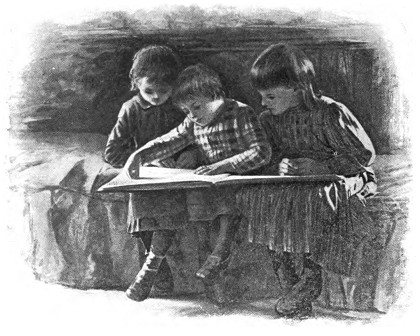 |
Web and Book design,
Copyright, Kellscraft Studio
1999-2010
(Return to Web Text-ures)
